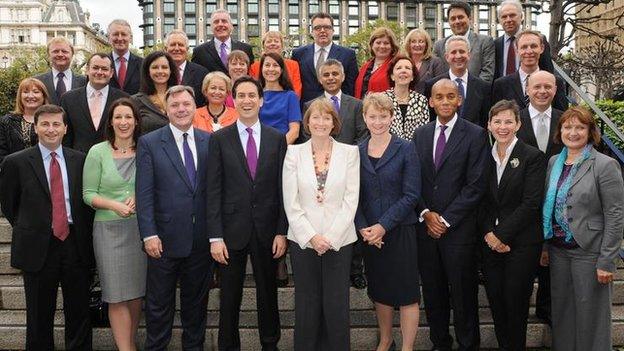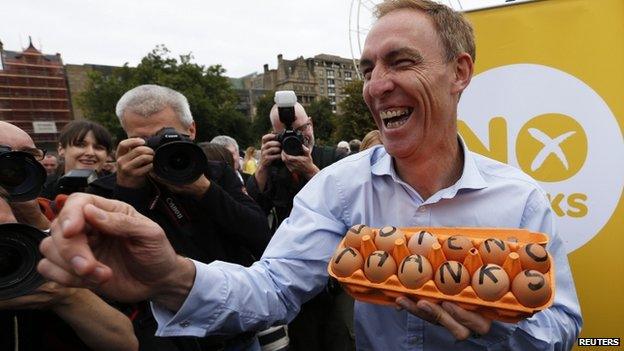Scottish Labour leadership: Murphy talks unity as battle to win begins
- Published
Jim Murphy MP tells the BBC that "something horrific and serious happened"
To many people in Scotland, Jim Murphy is that tall, lean politician who ran into the Clutha bar to help survivors of a helicopter crash.
To be fair, he has never attempted to trade on the image in any way.
On that dark November night, his shirt still stained with blood, he repeatedly asked me not to paint him as a hero, insisting others had done much more to help.
But his actions do suggest that the affable, softly-spoken, football fan has a steely core.
It could be detected again today.
If elected as leader, he insisted, he would be in complete control of the party in Scotland.
"That's the way it's going to be," he said, simply, adding that he would make it clear to UK Labour leader Ed Miliband that he was boss north of the border.

Jim Murphy is pictured to the back on the right in an Ed Miliband shadow cabinet line up

Jim Murphy faced the good and the bad when he took to the referendum campaign trail
But will he win the contest?
Mr Murphy is certainly popular in his well-heeled constituency of East Renfrewshire where he has spent his career turning a safe Tory seat into a redoubt for Labour.
It is a lesson in how to appeal to the centre, to win over non-traditional voters to the Labour cause.
He has done so by steering clear of the policies of the hard-left.
The 47-year-old was a loyal supporter of Tony Blair, voting for the Iraq war and university tuition fees.
My career and my working life in the House of Commons and in London is coming to an end
But to win this election, Mr Murphy knows he will need to appeal to all sections of the party.
And so, his rhetoric today is all about unity.
He is not interested in Old Labour or New Labour, left-wing Labour or right-wing Labour, he says.
He is interested in "losing Labour" and in "ending that period of Labour losing in Scotland."
Stand again
Mr Murphy says he will seek election to Holyrood in 2016, if not before. In the meantime he will stand again for Westminster at the general election.
He describes the strategy as "one election at a time" but concedes that "my career and my working life in the House of Commons and in London is coming to an end."
It seems a strange statement for someone about to seek re-election.
But Mr Murphy does have a rather comfortable buffer in East Renfrewshire, a majority in 2010 of 10,420 with the Conservatives in second place and the SNP trailing well behind the Liberal Democrats.
Increasingly, he argues, Edinburgh will be the "centre of political attention."
"That's where the action is and it's where I want to be," says Mr Murphy.
Whether or not he is successful will depend on a complicated, unpredictable system known as the electoral college which the party is in the process of ditching for UK leadership elections.
The winning candidate must secure support from an electorate in thirds.....
First are the parliamentarians, at Holyrood, Westminster and in the European Parliament.
Then there are the members of the party in Scotland.
And finally come the trades unions and societies in Scotland which are affiliated to Labour. They do not have a block vote, they must ballot their membership.
Nominations for the leadership close on Tuesday, voting begins on Monday 17 November and the new leader should be formally elected on Saturday 13 December.
Mr Murphy is certainly talking the talk. By Christmas we will know whether he is also walking the walk.